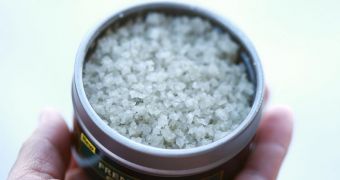Experts have known for a long time that people called supertasters have the ability to experience various flavors a lot more intensely than your average person. These individuals can taste bitter, salty and sour with increased proficiency, and a new study suggests that this may be one of the reasons why some people find it difficult to quit eating unhealthy food, LiveScience reports. According to a new investigation, it would appear that the inability to give up eating lots of salt may be of hereditary origin, at least in part.
The new work was conducted by investigators at the Pennsylvania State University, who were led by study researcher and assistant professor of food science John Hayes. The expert explains that this group of people is at an increased risk of suffering from obesity and related conditions, mainly because most fast foods are extremely rich in salts. In fact, the vast majority of such snacks rely heavily on their salty taste to attract consumers. Therefore, if a person has an increased acuity to sensing salt, then he or she will be far more likely than others to purchase products that fulfill their needs.
But consuming large quantities of salt daily has negative effects on the human body, such as increased blood pressure, and elevated risk of stroke. The scientists behind the new investigation say that the job of federal regulators, to find a means of curbing the level of salts in foods, is very complex. One of the things that few people know about supertasters is that they unconsciously use the taste of salt in some foods for “masking” other tastes, such as bitter.
“For example, cheese is a wonderful blend of dairy flavors from fermented milk, but also bitter tastes from ripening that are blocked by salt. A supertaster finds low-salt cheese unpleasant, because the bitterness is too pronounced,” explains Hayes. He adds that people should steer clear of products containing too much salt, and that they should orient themselves towards buying products that have less than 480 milligrams of salt per serving. Additional information of the new study were published in the June 16 issue of the esteemed scientific journal Physiology & Behavior.

 14 DAY TRIAL //
14 DAY TRIAL //